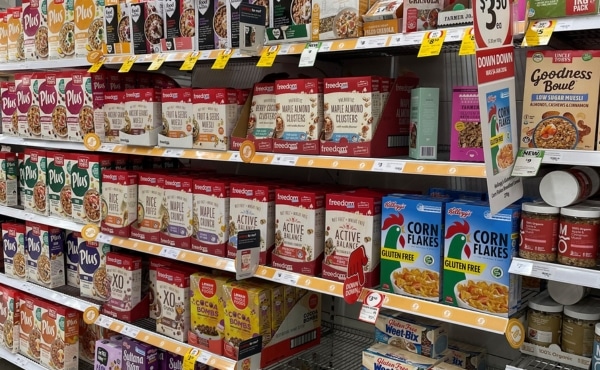What changes are happening to promote healthy choices at Coles?
A big one for Coles is that we have a Health in Every Aisle Strategy. That means you won’t find gluten-free cereal or healthy cereal in the health foods aisle and then ‘regular’ cereal in the cereal aisle. You won’t gluten-free or protein pasta in the health food aisle and then traditional pasta in the pasta aisle. You’ll find everything in one spot in the main aisle. There’s a couple of reasons for this. Firstly, our customers tell us that they find it confusing and time-consuming to need to shop two aisles for the same product. We want to make it simpler for them by putting it in one aisle. Secondly, we want the customers who weren’t shopping the health food aisle to find more healthy options. We know there are lots of customers who find the health food aisle confusing and so avoid it altogether. We want to get healthier products in front of them so that they have better choices.
The health food aisle will still be there, but it’ll become a place for new trends in health and wellness, not the products that were a new trend 10 years ago like gluten-free pasta, which should sit with the other pasta. We want the space to be genuinely new and exciting with innovations in mood-altering foods and elite sport supplements.
It’s a four-to-five-year project across our 850 stores. Beyond just locating products in the right location, we’re continuing to build out healthy options across every single category. A category like Muesli Bars which has traditionally been high-sugar and not considered healthy, we’ve made huge strides to bring in reduced and low sugar ranges as well as gluten free and nut free offers. We’re continuing to do this across every single category. We want customers to have great choices and be able to buy the products that suit their specific health needs.
What consumer trends have you noticed in the health space in the past year?
There are a lot of really interesting trends coming through. Customers are thinking about their health and their family’s health more holistically. Health foods have often focussed purely on physical health but there’s an increasing focus on mental and emotional wellbeing and products that deliver to this. We’re also seeing more customers seeking natural products and clean, simple ingredient lists. Over the last five years we’ve seen massive customer pushes to remove sugar, gluten, salt, fats etc. Replacing those ingredients often means quite complex reformulations with replacement ingredients that customers may not know and trust, so we’re seeing a lot of demand for simpler products that customers know and trust.
What are the next big trends in healthy breakfasts?
Breakfast is such an important meal for customers to set themselves up for a busy day. Over the Covid years where customers were more likely to be working and school from home, we saw a massive resurgence in the sit-down breakfast occasion and creating time in their day to enjoy breakfast. As we move beyond that, with more and more people returning to their busy life we’re seeing a strong resurgence and demand for convenience.
People are thinking about what can they eat on the go in their cars or easily assemble when they get to work. We’re continuing to see lots of demand and great innovation for low sugar and low carb offerings.
The cereal aisle is often completely avoided by people who are avoiding carbs and wanting to reduce sugar, so there are a lot of amazing products coming through which will help bring them back to the category.
If sugary cereals on the downward slide, what are people choosing instead?
We spend a lot of time understanding customer data to know what they are looking for and what they tell us is that they want to start their days healthily. As the day goes on they might be tempted with a delicious afternoon tea or post-dinner dessert but their intention is to start the day well. They also want sustained energy at breakfast, particularly parents who want their kids to be energised for their school day.
People are making lots of different choices. We continue to see really strong growth across our staple range of healthy breakfast cereals like Weet-Bix, Oats and Porridge and Corn Flakes. What customers love about these is that they are really simple, very healthy and great value products. Customers can add fruits, nuts and seeds to personalise them and make them more interesting but at their core they’re really simple and good for you.
We’re then seeing great growth across muesli and granola, particularly across low-sugar and carb reduced offers. These offers taste great and they’re quite versatile as well as you can add them to yoghurt, smoothies, chia puddings etc. Particularly for adult customers, we know they often prefer the texture of a crunchy breakfast which is more satiating. We’re also seeing customers get really creative with chia puddings, smoothie bowls, acai and other café-inspired offers.

Any tips for natural/organic start-ups on ways to cut through in food retail?
What’s most important for a business is to really understand who their customer is and how their product delivers something great for that customer. As a retailer I am truly customer obsessed. If I can’t see my customers loving it and buying it, then it’s not something I’m interested in. I’d really encourage any start-ups to take that same approach. If you start with your customer at the heart and never lose sight of that, you’re going to be in a much stronger position. Then I think it’s important to find what makes you different and special. Customers already know and love a stable of brands that they shop, so to get them to try something different, we’re looking for truly innovative and differentiated offers.
Be willing to start small and build up a customer base. We see a lot of start-ups that have great ideas and nice product, but they pitch to us before they’ve ever sold a product into a smaller retailer or e-comm. I absolutely love and admire that ambition but as a major supermarket retailer, we’re looking for supply partners who have the right level of manufacturing and operational experience to service us and our stores and the right level of customer awareness to be successful. We love finding small and new suppliers to partner with and help to grow but it’s important we do that in the right way.
What tips do you have for small retailers trying to create compelling product ranges that are healthy and good value?
Keep the customer at the heart of what you’re doing. Is the quality good enough, is the nutritional profile strong enough, is the packaging and format user friendly and going to meet their needs, is the price you’re charging really fair? Be your own harshest critic and that will help you create something that is truly amazing and deserving of customers picking up off the shelf.
How have factors like inflation, interest rates and general uncertainty impacted consumer behaviour in the health sector?
Customers are really conscious of the cost of their weekly shop and the health sector isn’t immune from that pressure. We know customers still value their health and don’t want to make sacrifices on quality or health. We’re obsessed with how we lower the cost of a basket to enable healthier choices. That’s where Private Label and other value offers have a really important role to play in helping customers manage their spend. We’re seeing Private Label grow faster than proprietary brands because of the absolute value that customers are seeking. There’s an opportunity for brands to think about is how they offer customers great value so they stay relevant.
What are the next big trends in the health space at Coles?
Sports Nutrition is a massive trend that we’re investing a lot of space and range into. From top-tier elite athletes through to the average person just wanting to feel a bit better, we want to have the right range to support their nutrition and training needs. E-commerce and pharmacy channels have traditionally been really strong retailers in this segment but at Coles we see a great opportunity for us and our customers who want the convenience of buying these products in their regular grocery shop. They’re not necessarily new but we continue to see gluten–free and low-sugar offers resonate with customers. Whilst they are quite latent at the moment, we’re really excited by trends around mood and brain enhancing functional foods which might be the next big thing.
Melissa Matteo will speak about retail “opportunities, challenges and hard truths” at the Naturally Good Summit on June 5.
